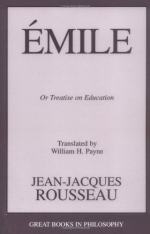
|
| Name: _________________________ | Period: ___________________ |
This test consists of 5 multiple choice questions, 5 short answer questions, and 10 short essay questions.
Multiple Choice Questions
1. Who begins to have an influence on the child after the mother has weaned the boy?
(a) God.
(b) The tutor.
(c) The nanny.
(d) The siblings.
2. How does Rousseau answer Emile's question about where babies come from?
(a) In explicit detail.
(b) He refuses to answer the question until Emile is older.
(c) Without describing sexual activity but without being deceitful.
(d) In polite euphemisms.
3. Whom does Rousseau address directly in the section on submission?
(a) Mothers.
(b) Tutors.
(c) Clergy.
(d) Gentlemen.
4. What was Rousseau's childhood household like?
(a) Harsh and silent.
(b) Loving and gentle.
(c) Cosmopolitan and literary.
(d) Violent and chaotic.
5. What does Rousseau say is the danger of books?
(a) That they do not all use the same meanings for words.
(b) That they require one to read yet more books.
(c) That they will lead to false belief.
(d) That they will not educate the spirit.
Short Answer Questions
1. How many children did Rousseau have?
2. How was Rousseau rewarded for writing "Emile"?
3. How did the man to whom Rousseau was apprenticed treat Rousseau?
4. Who should have the power in a family?
5. What argument does Rousseau use to support his emphasis on the need for physical activity in children?
Short Essay Questions
1. How does Rousseau describe man's second birth?
2. What kind of behavior is Rousseau urging people to avoid?
3. What does Rousseau say a child's first educational experience should be?
4. According to Rousseau, what allows a child to find the extra ability that allows him to grow?
5. How does Rousseau distinguish between self-love and selfishness?
6. How does Rousseau contrast book learning and experiential learning?
7. What advice does Rousseau give mothers?
8. What does Rousseau say about man's inherent moral nature?
9. What does Rousseau believe the parents' roles should be in raising a boy?
10. What does Rousseau say is the purpose of education?
|
This section contains 769 words (approx. 3 pages at 300 words per page) |

|




